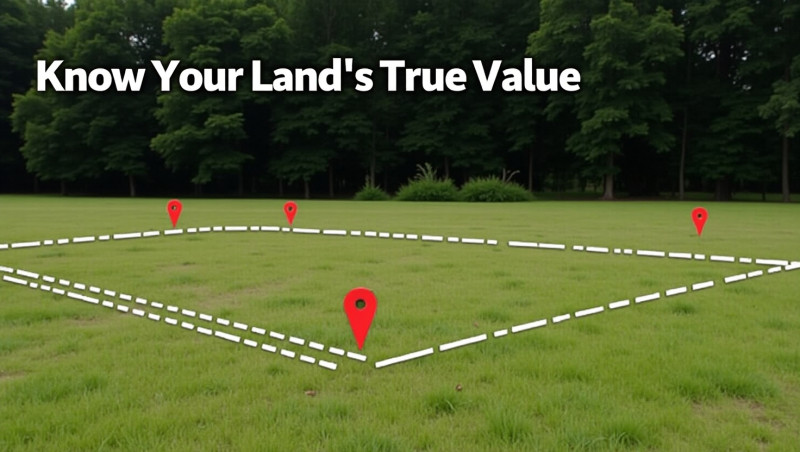- May 08, 2025
-
Know Your Land’s True Value Before Buying: Essential Documents & Smart Assessment Techniques
Buying land is a major life decision—it’s not just about money, but legacy and long-term value. Yet, many people jump into land deals without truly verifying what they’re buying. The result? Disputes, legal headaches, or financial loss.
Don’t worry—we’ve got your back. Here’s how to evaluate land the smart way—using official documents, digital surveys, and a little due diligence to ensure you're investing in something that’s 100% legitimate and worth the price.
1. Understanding A & B Schedule in Land Documents
Ever heard of A and B Schedule and thought, “What’s that?” You're not alone. These terms are common in land registration documents in India and they matter a lot when determining ownership clarity and extent of land.
🔍 What is A Schedule?
- Describes the main plot or parent land.
- Includes survey number, location, total area, and boundaries.
🔍 What is B Schedule?
- Refers to a specific portion or sub-division of the land mentioned in A Schedule.
- Usually describes the exact parcel you're purchasing—be it a flat in an apartment or a portion of land from a larger property.
✅ Always verify that the land you're buying (B Schedule) matches the main ownership document (A Schedule). If there’s any inconsistency—pause the deal and get legal advice.
2. Conducting a DGPS Survey for Precision
Let’s face it: verbal claims mean nothing in real estate. That’s where technology comes in. A DGPS (Differential Global Positioning System) survey helps you measure land with pinpoint accuracy.
Why Use a DGPS Survey?
- Confirms actual boundaries on the ground
- Prevents boundary encroachments or disputes
- Identifies mismatches between legal and physical area
- Helps create precise site plans or layout drawings
Who Performs It?
Hire a licensed land surveyor or geospatial firm equipped with DGPS tools. Most districts in India now allow survey integration with government mapping portals for validation.
🔍 Pro Tip: After the survey, compare the DGPS map with your FMB sketch and Patta. Everything should match, or you’re buying trouble.
3. How to Get an A Registration Copy
The A Registration Copy is your golden ticket to proving ownership legitimacy. It’s a certified copy of the registered document held at the sub-registrar’s office.
Steps to Obtain It:
- Visit the Sub-Registrar Office where the land was registered.
- Provide the Survey Number and owner’s name.
- Request a certified copy of the sale deed (usually a small fee is charged).
- Verify:
- Ownership chain
- Survey details
- Stamp duty and registration validity
- Any pending encumbrances or legal hurdles
📁 Bonus Tip: Keep both a physical and digital copy of the A Registration for easy reference and legal safety.
4. Additional Steps to Confirm True Land Value
Legal documents are great—but don’t stop there. Real value means legal, financial, and physical clarity. Here's what else you should do:
✔️ Check the Encumbrance Certificate (EC)
Confirms whether the land:
- Is mortgaged or under any legal claim
- Has been involved in multiple sales or inheritance disputes
💡 Get EC for the past 15 years, not just the recent one.
✔️ Verify Sale Deed & Title Deed
- Confirms ownership transfer
- Shows sale history and ensures you’re buying from the right person
✔️ Confirm Land Classification
Is the land:
- Agricultural?
- Residential?
- Commercial?
You can’t build a house on agricultural land without conversion approval!
✔️ Cross-check Government Records
You can check these:
- Patta and Adangal via TN e-Services
- FMB Sketch from Revenue Office
- UDR Copy (if urban property)
- Village maps and survey details through taluk office
📋Land Value Checklist Before You Buy
FAQs
Q1: What is the difference between A and B Schedule in land documents?
A Schedule refers to the entire property, while B Schedule identifies the specific portion being transacted.
Q2: Is a DGPS survey mandatory?
Not legally—but it's highly recommended, especially for large plots or disputed boundaries.
Q3: What is an A Registration Copy?
It’s a certified document from the sub-registrar office confirming property registration details.
Q4: Can I get all these documents online?
Many are available through state portals (like TN e-Services), but physical visits may still be needed for certified copies.
Final Thoughts: Think Beyond the Price Tag
Land might seem like a “solid” investment—but if the foundation is shaky (read: poor documentation), it can crumble into a legal mess. So before you buy, take these smart steps:
✅ Understand what you're buying (A vs. B Schedule)
✅ Survey it properly with DGPS
✅ Get legal documents verified and certified
✅ Match every paper with the physical site
Remember: It’s not just about land—it’s about peace of mind. So slow down, verify thoroughly, and invest wisely.


Comments :
Currently, there are no comments in this post. Be the first person to comment on this post.